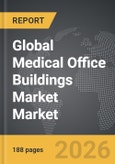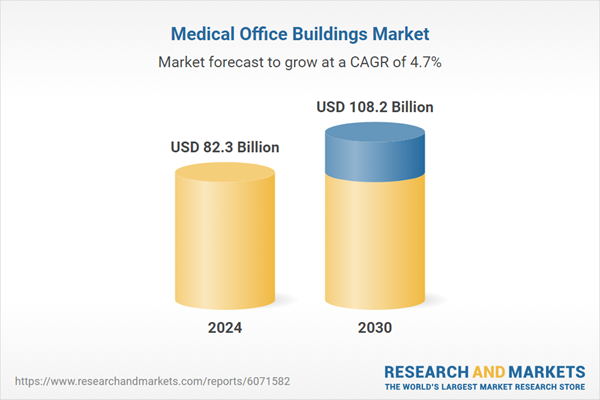Global Medical Office Buildings Market - Key Trends & Drivers Summarized
The medical office buildings (MOBs) market is experiencing significant growth, driven by the increasing demand for outpatient healthcare services, the rise of telemedicine, and shifting patient preferences toward convenient, community-based care centers. As healthcare systems transition from hospital-centric care to outpatient and specialty clinics, the need for modern, well-equipped, and strategically located medical office spaces is rising. Investors, healthcare providers, and real estate developers are capitalizing on this trend by designing MOBs that offer flexibility, integrated technology, and sustainable infrastructure.What Are the Emerging Trends Shaping the Medical Office Buildings Market?
One of the most significant trends in the MOB market is the growing shift toward outpatient care. With rising healthcare costs and advancements in minimally invasive procedures, diagnostics, and remote monitoring, hospitals are shifting more services to ambulatory care centers, specialty clinics, and urgent care facilities. This transition is fueling demand for MOBs that can accommodate multi-specialty practices, surgical centers, and diagnostic imaging labs under one roof.Another key trend is the integration of telehealth and digital health infrastructure into MOBs. The rapid growth of telemedicine and hybrid healthcare models is influencing building designs, with telehealth suites, AI-powered patient management systems, and remote consultation hubs becoming essential features. Smart medical offices equipped with IoT-enabled medical devices, automated check-in systems, and virtual reality (VR)-assisted diagnostics are reshaping how healthcare is delivered in outpatient settings.
Sustainability and green building initiatives are also playing a crucial role in shaping the medical office space industry. With increasing environmental concerns, MOBs are incorporating LEED-certified energy-efficient designs, renewable energy solutions, and eco-friendly construction materials. Features such as improved air filtration systems, smart lighting, and water conservation technologies are enhancing patient comfort, operational efficiency, and overall sustainability.
How Are Technological Advancements Driving the Market?
Technological advancements in healthcare infrastructure and building automation are transforming the medical office space market. One of the most notable developments is the integration of AI-driven facility management systems, which optimize space utilization, security, and energy efficiency. Smart MOBs are equipped with automated HVAC systems, real-time patient flow tracking, and AI-assisted appointment scheduling, ensuring seamless operations and reduced administrative burden.Another breakthrough is the adoption of modular and flexible medical office designs. As healthcare services evolve, MOBs are being designed to accommodate changing space requirements, specialty expansions, and medical technology upgrades. Modular layouts, prefabricated construction elements, and convertible treatment rooms allow healthcare providers to adapt to patient needs, integrate new medical services, and optimize resource allocation without major structural modifications.
The incorporation of robotic process automation (RPA) and AI-powered security systems is also enhancing MOB efficiency. Many modern medical office buildings now feature touchless entry systems, AI-driven surveillance cameras, and robotic assistants for inventory management and patient navigation. These advancements help improve safety, compliance, and operational workflows, ensuring a seamless experience for both patients and medical professionals.
What Is Driving the Growth of the Medical Office Buildings Market?
The growth in the medical office buildings market is driven by several factors, including the rising demand for healthcare services, an aging population, and increased investment in outpatient care facilities. As the global population ages and chronic disease rates rise, healthcare providers are expanding their networks of specialty clinics, diagnostic centers, and rehabilitation facilities, boosting demand for well-located MOBs.The shift from hospital-based care to decentralized, patient-centric healthcare models is another key driver. Many healthcare systems are reducing hospital stays and focusing on ambulatory care, same-day surgery centers, and community-based medical hubs. This transition is creating opportunities for real estate developers and healthcare investors to develop MOBs that provide high-quality outpatient care closer to residential areas.
Another major growth factor is the expansion of healthcare real estate investment trusts (REITs) and private equity funding in the MOB sector. Investors view medical office buildings as stable, recession-resistant assets, given their long-term tenant occupancy, steady rental income, and resilience to economic downturns. The increased financial backing for state-of-the-art MOB developments, healthcare campus expansions, and mixed-use medical real estate projects is accelerating market growth.
As demand for modern, technology-integrated, and patient-friendly medical office spaces continues to rise, the future of the MOB market will be shaped by smart healthcare facilities, digital health integration, and sustainable construction practices. With innovative building designs, advanced healthcare technologies, and patient-centric service models, MOBs are set to become the cornerstone of next-generation outpatient care delivery worldwide.
Report Scope
The report analyzes the Medical Office Buildings market, presented in terms of market value (US$). The analysis covers the key segments and geographic regions outlined below:- Segments: Type (Physician Offices, Ambulatory Surgery Centers, Wellness Centers, Others).
- Geographic Regions/Countries: World; United States; Canada; Japan; China; Europe (France; Germany; Italy; United Kingdom; Spain; Russia; and Rest of Europe); Asia-Pacific (Australia; India; South Korea; and Rest of Asia-Pacific); Latin America (Argentina; Brazil; Mexico; and Rest of Latin America); Middle East (Iran; Israel; Saudi Arabia; United Arab Emirates; and Rest of Middle East); and Africa.
Key Insights:
- Market Growth: Understand the significant growth trajectory of the Physician Offices segment, which is expected to reach US$47.9 Billion by 2030 with a CAGR of a 3.9%. The Ambulatory Surgery Centers segment is also set to grow at 5% CAGR over the analysis period.
- Regional Analysis: Gain insights into the U.S. market, valued at $22.4 Billion in 2024, and China, forecasted to grow at an impressive 7.3% CAGR to reach $21.1 Billion by 2030. Discover growth trends in other key regions, including Japan, Canada, Germany, and the Asia-Pacific.
Why You Should Buy This Report:
- Detailed Market Analysis: Access a thorough analysis of the Global Medical Office Buildings Market, covering all major geographic regions and market segments.
- Competitive Insights: Get an overview of the competitive landscape, including the market presence of major players across different geographies.
- Future Trends and Drivers: Understand the key trends and drivers shaping the future of the Global Medical Office Buildings Market.
- Actionable Insights: Benefit from actionable insights that can help you identify new revenue opportunities and make strategic business decisions.
Key Questions Answered:
- How is the Global Medical Office Buildings Market expected to evolve by 2030?
- What are the main drivers and restraints affecting the market?
- Which market segments will grow the most over the forecast period?
- How will market shares for different regions and segments change by 2030?
- Who are the leading players in the market, and what are their prospects?
Report Features:
- Comprehensive Market Data: Independent analysis of annual sales and market forecasts in US$ Million from 2024 to 2030.
- In-Depth Regional Analysis: Detailed insights into key markets, including the U.S., China, Japan, Canada, Europe, Asia-Pacific, Latin America, Middle East, and Africa.
- Company Profiles: Coverage of players such as American Healthcare REIT, Clark Group, Health Care REIT, Inc., Healthcare Realty Trust, Healthpeak Properties and more.
- Complimentary Updates: Receive free report updates for one year to keep you informed of the latest market developments.
Some of the 44 companies featured in this Medical Office Buildings market report include:
- American Healthcare REIT
- Clark Group
- Health Care REIT, Inc.
- Healthcare Realty Trust
- Healthpeak Properties
- Hensel Phelps
- Kayne Anderson Real Estate
- Lillibridge Healthcare Services
- McCarthy Building Companies
- Medical Properties Trust
- Montecito Medical Real Estate
- Omega Healthcare Investors
- PCL Construction
- Physicians Realty Trust
- Realty Trust Group
- Skanska USA
- Swinerton
- Trammell Crow Company
- Ventas, Inc.
- Welltower Inc.
This edition integrates the latest global trade and economic shifts into comprehensive market analysis. Key updates include:
- Tariff and Trade Impact: Insights into global tariff negotiations across 180+ countries, with analysis of supply chain turbulence, sourcing disruptions, and geographic realignment. Special focus on 2025 as a pivotal year for trade tensions, including updated perspectives on the Trump-era tariffs.
- Adjusted Forecasts and Analytics: Revised global and regional market forecasts through 2030, incorporating tariff effects, economic uncertainty, and structural changes in globalization. Includes historical analysis from 2015 to 2023.
- Strategic Market Dynamics: Evaluation of revised market prospects, regional outlooks, and key economic indicators such as population and urbanization trends.
- Innovation & Technology Trends: Latest developments in product and process innovation, emerging technologies, and key industry drivers shaping the competitive landscape.
- Competitive Intelligence: Updated global market share estimates for 2025, competitive positioning of major players (Strong/Active/Niche/Trivial), and refined focus on leading global brands and core players.
- Expert Insight & Commentary: Strategic analysis from economists, trade experts, and domain specialists to contextualize market shifts and identify emerging opportunities.
Table of Contents
Companies Mentioned (Partial List)
A selection of companies mentioned in this report includes, but is not limited to:
- American Healthcare REIT
- Clark Group
- Health Care REIT, Inc.
- Healthcare Realty Trust
- Healthpeak Properties
- Hensel Phelps
- Kayne Anderson Real Estate
- Lillibridge Healthcare Services
- McCarthy Building Companies
- Medical Properties Trust
- Montecito Medical Real Estate
- Omega Healthcare Investors
- PCL Construction
- Physicians Realty Trust
- Realty Trust Group
- Skanska USA
- Swinerton
- Trammell Crow Company
- Ventas, Inc.
- Welltower Inc.
Table Information
| Report Attribute | Details |
|---|---|
| No. of Pages | 188 |
| Published | February 2026 |
| Forecast Period | 2024 - 2030 |
| Estimated Market Value ( USD | $ 82.3 Billion |
| Forecasted Market Value ( USD | $ 108.2 Billion |
| Compound Annual Growth Rate | 4.7% |
| Regions Covered | Global |









